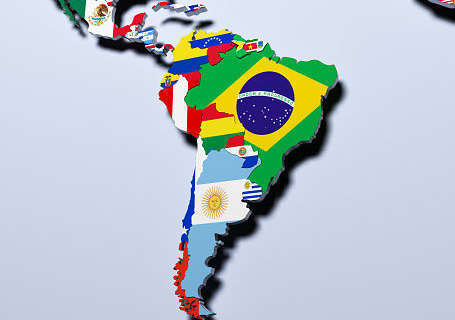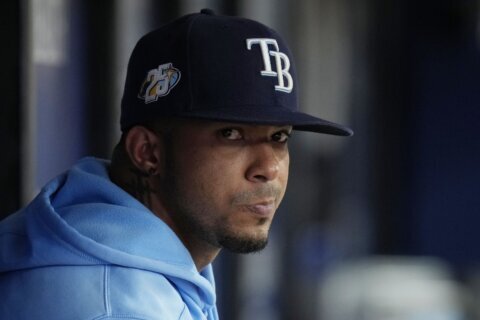MEXICO CITY (AP) — A judge in Honduras has ruled that former President Juan Orlando Hernández should be extradited to the United States to face drug trafficking and weapons charges.
Wednesday’s decision came one month after police arrested Hernández at his home at the request of the U.S. government.
While Hernández was president, he was untouchable for Honduras’ coopted justice system and successive U.S. administrations made no move alienate him.
Most of the allegations against Hernández emerged in two trials in New York — those of Juan Antonio “Tony” Hernández, the president’s brother and himself a former Honduran congressman, and Geovanny Fuentes Ramírez. Both men were part of a sprawling drug trafficking case filed in 2015 and both were given life sentences. Prosecutors labeled Juan Orlando Hernández a “co-conspirator” in the same case.
Since Hernández’s arrest, another potentially critical piece of the case has fallen into place. Honduran police last week arrested Juan Carlos Bonilla Valladares, also at U.S. request. He was the country’s top police official in 2012 and 2013. Better known as “El Tigre,” or “The Tiger,” Bonilla could have knowledge of wrongdoing by Hernández and other Honduran officials.
WHAT CHARGES WOULD JUAN ORLANDO HERNÁNDEZ FACE IN THE U.S.?
U.S. prosecutors have not unsealed an indictment of Hernández, but a statement from the Honduran court system announcing Wednesday’s extradition decision listed three charges: conspiracy to import and distribute drugs to the United States, using firearms in support of a drug trafficking conspiracy and conspiracy to use firearms in support of drug trafficking. They appear to mirror the charges that got his brother a life sentence, though the brother also faced a false statements charge.
WHAT ALLEGATIONS HAVE U.S. PROSECUTORS MADE ABOUT HERNÁNDEZ?
At the March 2021 sentencing of Tony Hernández, Assistant U.S. Attorney Matthew Laroche called his actions “state-sponsored drug trafficking.”
The crux of prosecutors’ accusations is that Juan Orlando Hernández used bribes and support from drug traffickers to fuel his political rise from a congressman representing rural Lempira in western Honduras to president of the National Congress and then two consecutive presidential terms. In exchange, traffickers allegedly were allowed to operate unencumbered, received information that helped them avoid authorities and sometimes even had security forces in their service.
Hernández became head of Congress in early 2010. By 2013, he was campaigning for president and allegedly solicited $1.6 million from a drug trafficker to support his campaign and those of other politicians in the National Party, according to U.S. authorities.
Tony Hernández also received $1 million from Mexican kingpin Joaquin “El Chapo” Guzmán to support his brother’s campaign. Tony Hernández had promised the Sinaloa Cartel leader that if his brother won the presidency, they could protect Guzmán’s drug shipments through Honduras.
Juan Orlando Hernández took office Jan. 27, 2014. U.S. authorities allege he continued receiving drug profits while in office in exchange for allowing drugs to move through Honduras.
Witnesses in the two-week Fuentes Ramírez trial, shortly before Tony Hernández’s sentencing, told of Hernández accepting bribes from Fuentes Ramírez and other traffickers from his time as a presidential candidate up through at least 2019.
It was during that trial that Assistant U.S. Attorney Jacob Gutwillig said an accountant had heard Juan Orlando Hernández say he wanted to “shove the drugs right up the noses of the gringos.’”
Also during the Fuentes Ramírez trial, Devis Leonel Rivera Maradiaga, former leader of the Cachiros cartel, testified that he had sent $250,000 to Juan Orlando Hernández in 2012 through his sister in exchange for protection of his smuggling business and to avoid extradition. An accountant testified that he twice witnessed Hernández receiving bribes from Fuentes Ramírez in 2013.
WHAT HAS HERNÁNDEZ SAID?
Each time the allegations have been made by U.S. prosecutors, Hernández has strenuously denied any illegal activity and dismissed his accusers as drug traffickers seeking revenge against him by making up stories.
Just before the decision was read in court Wednesday night — it had already leaked to local media — Hernández circulated a video thanking those had defended him and continued to stand by him. He repeated his assertion the allegations were revenge by the drug traffickers he had battled during his administration and said he was proud of his record in office.
He also took issue with the court process.
“There is an enormous difference between the way you are judged in the United States and here because the two systems are very different,” Hernández said. “The (extradition) treaty speaks of irrefutable, conclusive evidence, and that has not come in this request.”
HOW SOON COULD HERNÁNDEZ BE EXTRADITED?
Hernández’s lawyers have three days to file an appeal, which would be heard by the full Supreme Court of Justice. Experts say its decision could come within days and if approved, extradition would follow almost immediately.
Copyright © 2024 The Associated Press. All rights reserved. This material may not be published, broadcast, written or redistributed.







